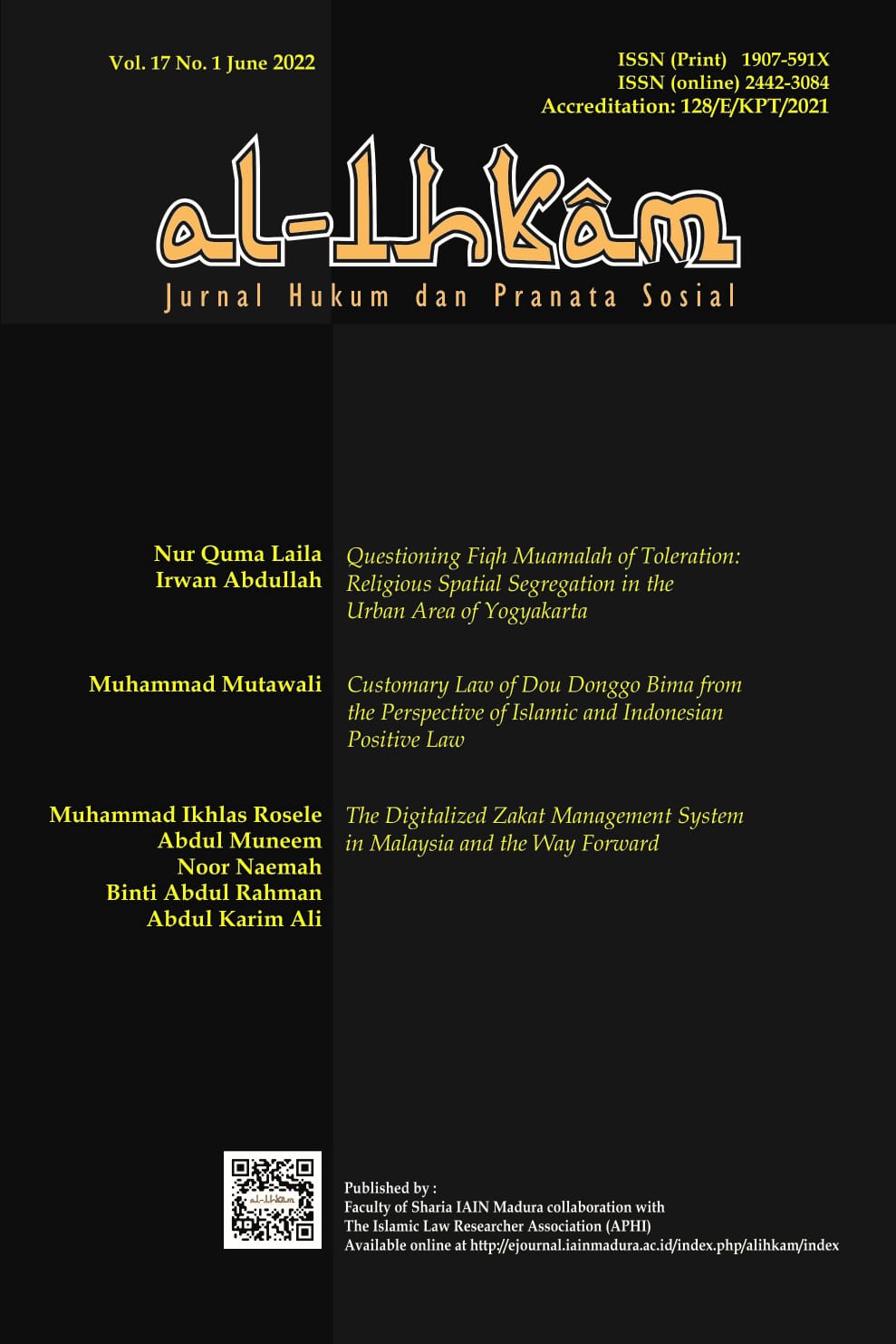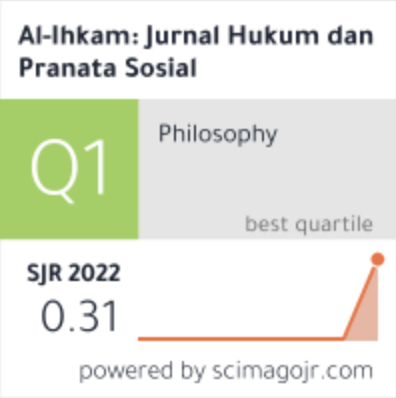From the Public Space to the Prison Space: Regulation Polemic and the Implementation of Caning Law in Aceh
 Abstract views: 711
,
Abstract views: 711
,
 PDF downloads: 457
PDF downloads: 457
Abstract
The implementation of caning law in Aceh Province is still sporadic due to a lack of coordination among the government institutions involved in caning law. Then, the prison infrastructure to impose the canning law is also not ade-quate, and socialization has also not been fully carried out. Besides, in deter-mining the location of the caning, Islamic law requires the fulfillment of two principles namely “open space” and “visible” to the public. Furthermore, the law that guides the implementation of sharia in Aceh does not regulate detail of where the caning can be executed. Hence, the issues that need to be scruti-nized in this study are about shifting the norm from “open space" to “prison space” and why there is a disparity in determining the place of caning sentenc-es. This study uses a normative legal method by relying on secondary data. All collected data were analyzed by using qualitative analysis. The results show that there has been a shifting norm from "open space" to “prison space” in the application of the caning sentences in Aceh. This shift starts from the open area in the courtyard of the mosque to the prison area as a place to execute a caning sentence. This shifting also allows the people who meet certain criteria to wit-ness the execution of a caning sentence. In addition, there is also a disparity among the sharia courts due to the lack of facilities available in certain the sha-ria courts in Aceh. Hence, the Aceh government needs to improve the facilities of the sharia courts to be able to execute caning sentences.
Downloads
References
Aceh, Government of. “Qanun Aceh No. 12 of 2003 Concerning Alcoholic.,” 2003.
Al-Nawawi, Mahyuddin bin Syaraf. Majmu’ Syarah Al-Muhazzab. IV. Beirut: Maktabah al-’Alamiyah, 2017.
Al-Zuhaili, Wahbah. Al-Fiqh Al-Islami Wa Adillatuhu. Dar Al-Fikr. VII. Vol. 8. Damaskus: Dar al-Fikr, 2007.
Armia, Muhammad Siddiq. “Public Caning: Should It Be Maintained Or Eliminated? (A Reflection of Implementation Sharia Law In Indonesia).” QIJIS: Qudus International Journal of Islamic Studies 7, no. 2 (2019): 301–28.
Audah, ’Abd al-Qadir. Al-Tasyri’ Al-Jina’i Al-Islami Muqarinan Bi Al-Qanun Al-Wad’i. IV. Cairo: Maktabah al-Usrah, 2011.
Berutu, A G. “Peran Polri, Kejaksaan Dan Mahkamah Adat Aceh Dalam Penegakan Syariat Islam Di Aceh.” Ahkam: Jurnal Hukum Islam 7, no. 2 (2019). https://doi.org/10.21274/ahkam.2019.7.2.CITATIONS.
Chambert-Loir, Henri. Islamic Law in 17th Century Aceh. Archipel, 2017. https://doi.org/10.4000/archipel.444.
Chong, Chee Huay, and Kee Jiar Yeo. “The Residue Effects of Parental Corporal Punishment on Young Adults’ Psychological Adjustment: Evidence From Malaysia.” SAGE Open 8, no. 1 (2018). https://doi.org/10.1177/2158244018757287.
Fanani, Ahmad Fuad. “The Implementation of Sharia Bylaws and Its Negative Social Outcome For Indonesian Women.” Indonesian Journal of Islam and Muslim Societies 7, no. 2 (2017): 153–74. https://doi.org/10.18326/ijims.v7i2.153-174.
Farrel. “Judicial Corporal Punishment Picture: Judicial and Prison Punishment Pictures From Various Countries.” Journal of Social Sciences 7, no. 11 (2018).
———. “Judicial Corporal Punishment Picture: Judicial and Prison Punishment Pictures From Various Countries.” Journal of Social Sciences 7, no. 11 (2018).
Fazel, Seena, and Achim Wolf. “A Systematic Review of Criminal Recidivism Rates Worldwide: Current Difficulties and Recommendations for Best Practice.” PLoS ONE 10, no. 6 (2015): 1–8. https://doi.org/10.1371/journal.pone.0130390.
Febriandi, Yogi, Muhammad Ansor, and Nursiti Nursiti. “Seeking Justice Through Qanun Jinayat: The Narratives of Female Victims of Sexual Violence in Aceh, Indonesia.” QIJIS (Qudus International Journal of Islamic Studies) 9, no. 1 (2021): 103. https://doi.org/10.21043/qijis.v9i1.8029.
Feener, R. Michael. “Engineering Transformations in the ‘Religion-Development Nexus’: Islamic Law, Reform, and Reconstruction in Aceh.” Religion 51, no. 1 (2021): 40–57. https://doi.org/10.1080/0048721X.2020.1792051.
———. Shari’a and Social Engineering: The Implementation of Islamic Law in Contemporary Aceh, Indonesia. Edited by Anver M. Emon. I. Oxford, United Kingdom: Oxford University Press, 2013.
Fonseca, David S. “Reimagining the Sociology of Punishment through the Global-South: Postcolonial Social Control and Modernization Discontents.” Punishment and Society 20, no. 1 (2018): 54–72. https://doi.org/10.1177/1462474517740888.
Gershoff, Elizabeth T. “School Corporal Punishment in Global Perspective: Prevalence, Outcomes, and Efforts at Intervention.” Psychology, Health, and Medicine 22 (2017): 224–39. https://doi.org/10.1080/13548506.2016.1271955.
Hall, Damon M., and Rebecca Steiner. “Policy Content Analysis: Qualitative Method For Analyzing Sub-National Insect Pollinator Legislation.” MethodsX 7 (2020): 100787. https://doi.org/10.1016/j.mex.2020.100787.
Hasni, Khairul. “Sharia Police: Gender Discrimination and Elite Politics in Aceh.” Al_Hayat: Journal of Islamic Education 4, no. 1 (2020): 7728.
Ichwan, Moch Nur, Arskal Salim, Eka Srimulyani, and Arskal Salim. “Islam and Dormant Citizenship: Soft Religious Ethno-Nationalism and Minorities in Aceh, Indonesia.” Islam and Christian–Muslim Relations 0, no. 0 (2020): 1–26. https://doi.org/10.1080/09596410.2020.1780407.
Idria, Reza. “Tales of The Unexpected : Contesting Syari’ah Law in Aceh, Indonesia.” Harvard, 2020.
Indria, Reza. “Provisional Notes on How ‘Hilarious’ Living Under Sharia Law (The Case of Aceh).” Kawula: Journal of Local Culture 5, no. 2 (2018).
Irma, Ade, Mohd Hatta, and Syukur Kholil. “Communication Management of Islamic Sharia Agency in Applying Women’s Islamic Fashion in Banda Aceh.” In Budapest International Research and Critics Institute (BIRCI-Journal) : Humanities and Social Sciences, edited by Norshahril Saat and Ahmad Najib Burhani, 3:576–87. Singapore: ISEAS Publishing, 2020. https://doi.org/10.33258/birci.v3i1.808.
Kurniaty, Rika. “Local Elites and Public Space Sustainability: The Local Elite Roles in the Presence and Usage of Public Space in Malang Raya, Indonesia.” Procedia Environmental Sciences 20 (2014): 506–15. https://doi.org/10.1016/j.proenv.2014.03.063.
Luo, Chuanyu. “Brunei’s Islamic Law: Introduction and Comments. In China-ASEAN Relations: Cooperation and Development.” Series on China-ASEAN Relations 1 (2018).
Maan, Tim, and Dina Afrianty. “Aceh’s Islamic Criminal Code Formalising Discrimination.” In Crime and Punishment in Indonesia, 1:135–80. Routledge, 2020. https://doi.org/10.15642/JIIS.2007.1.1.135-180.
Muhammad, Mansuri. “Daur Al-Siyasah Al-Jina’iyah Fi Tahqiq Al-’Adalah Al-Jina’iyah (Dirasah Syar’iyah Maqasidiyah).” Majalah Al-Buhuts Wa Al-Dirasat 1, no. 17 (2020).
Muhammadin, Fajri Matahati, Dian Agung Wicaksono, Almonika Cindy Fatika Sari, and Ola Anisa Ayutama. “Lashing in Qanun Aceh and The Convention Against Torture: A Critical Appraisal.” Malaysian Journal of Syariah and Law 7, no. 1 (2019): 11–24.
Newspaper, Serambi Indonesia. “Serambi Indonesia.” April 13, 2013.
———. “Serambi Indonesia.” April 16, 2018.
———. “Serambi Indonesia.” April 21, 2018.
Ong, Benjamin Joshua. “The Doctrine of Severability In Constitutional Review: A Perspective From Singapore.” Statute Law Review 40, no. 2 (2019): 150–74. https://doi.org/10.1093/slr/hmx030.
Otto, Benjamin, and Jan Michiel Otto. “Shari’a Police in Banda Aceh: Enforcement of Islam-Based Regulations and People’s Perceptions.” In Islam and The Limits of the State Reconfigurations of Practice, Community and Authority in Contemporary Aceh. Leiden: Brill, 2016.
Rani, Faisal A. “Islam and National Law: A Formal Legal Review on Sharia Laws in Aceh.” Al-Risalah: Forum Kajian Hukum Dan Sosial Kemasyarakatan 20, no. 1 (2020): 47–57. https://doi.org/10.30631/al-risalah.v20i1.521.
Rebellon, Cesar J., and Murray Straus. “Corporal Punishment and Adult Antisocial Behavior: A Comparison of Dyadic Concordance Types and an Evaluation of Mediating Mechanisms in Asia, Europe, and North America.” International Journal of Behavioral Development 41, no. 4 (2017): 503–13. https://doi.org/10.1177/0165025417708342.
Sharief, Efrizal Harun, Wika Hawasara, and Ramlani Lina Sinaulan. “Hate Speech Through Social Media in Indonesia: Based on Space Transition Theory in Cyber Criminology.” In International Seminar Welcoming The Society 5.0 With Writing Literacy Acceleration, 337–45, 2021.
Sufiarina. “The Position and Competence of The Shariah Court of Nanggroe Aceh Darussalam in Indonesia Justice System.” Indonesia Law Review 5, no. 2 (2015): 165–86.
Copyright (c) 2022 AL-IHKAM: Jurnal Hukum & Pranata Sosial

This work is licensed under a Creative Commons Attribution-ShareAlike 4.0 International License.
In order to be accepted and published by Al-Ihkam: Jurnal Hukum dan Pranata Sosial, author(s) submitting the article manuscript should complete all the review stages. By submitting the manuscript, the author(s) agreed to the following terms:
- The copyright of received articles shall be assigned to Al-Ihkam: Jurnal Hukum dan Pranata Sosial as the publisher of the journal. The intended copyright includes the right to publish articles in various forms (including reprints). Al-Ihkam: Jurnal Hukum dan Pranata Sosial maintain the publishing rights to the published articles.
- Authors are permitted to disseminate published articles by sharing the link/DOI of the article at Al-Ihkam: Jurnal Hukum dan Pranata Sosial. Authors are allowed to use their articles for any legal purposes deemed necessary without written permission from Al-Ihkam: Jurnal Hukum dan Pranata Sosial with an acknowledgment of initial publication to this journal.
- Users/public use of this website will be licensed to CC-BY-SA.



.png)
_1.png)










